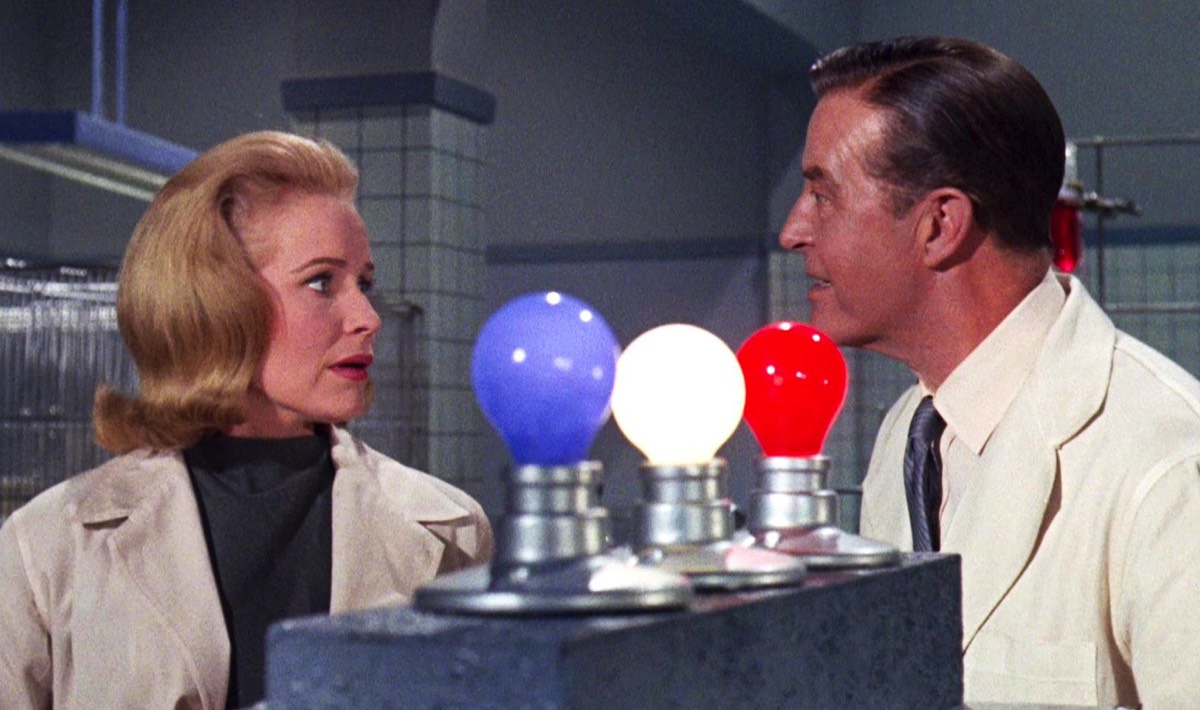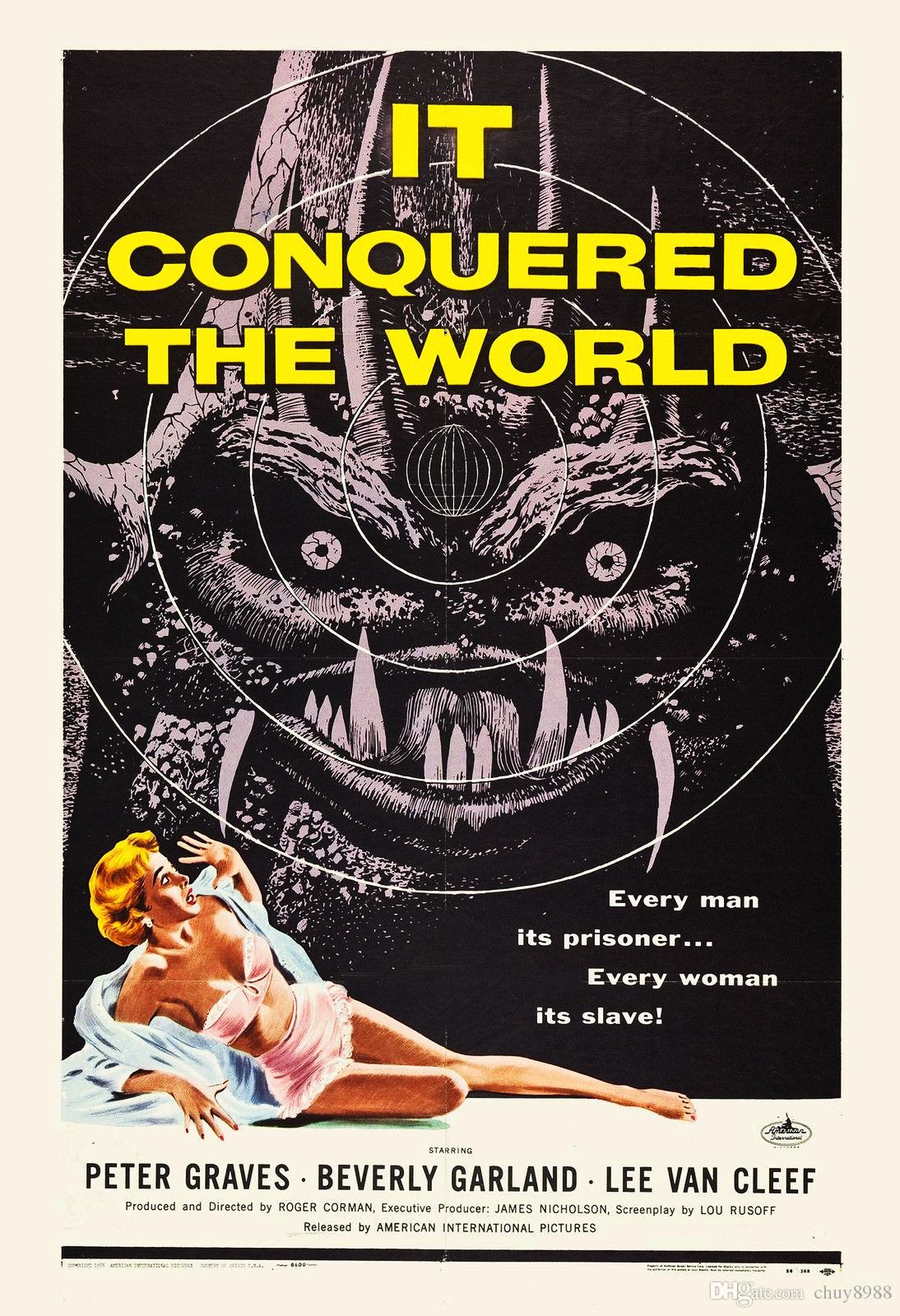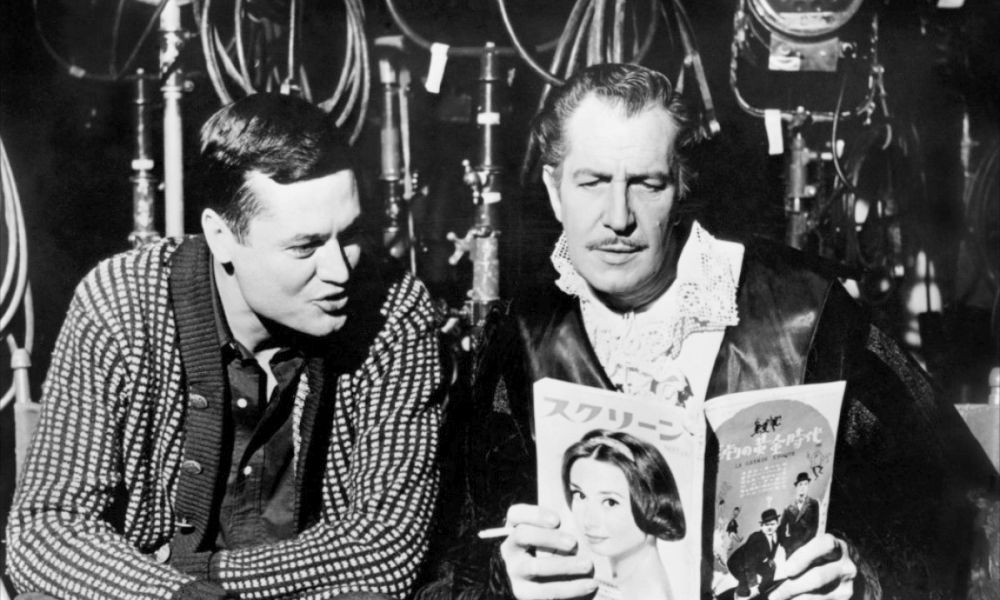"Though, for most of his prolific directing career, Corman churned out sci-fi, horror, westerns and teen melodramas for the drive-in crowd, inventive pragmatism and absurdist irony ensured that they were not only entertaining and to-the-point (virtually every film displayed its requisite quota of sexual intrigue, fast-paced action and violence), but surprisingly intelligent." - Geoff Andrew (The Director's Vision, 1999)
Roger Corman
Director / Producer
(1926-2024) Born April 5, Detroit, Michigan, USA
(1926-2024) Born April 5, Detroit, Michigan, USA
Key Production Country: USA
Key Genres: Horror, Costume Horror, Gothic Film, Science Fiction, Drama, Crime Drama, Crime, Horror Comedy, Psychological Drama, Creature Film, Supernatural Horror, Gangster Film
Key Collaborators: Daniel Haller (Production Designer), Dick Miller (Character Actor), Floyd Crosby (Cinematographer), Barboura Morris (Character Actress), Ronald Sinclair (Editor), Ronald Stein (Composer), Jonathan Haze (Character Actor), Vincent Price (Leading Actor), Charles B. Griffith (Screenwriter), Anthony Carras (Editor), Les Baxter (Composer), Bruno VeSota (Character Actor)
Key Genres: Horror, Costume Horror, Gothic Film, Science Fiction, Drama, Crime Drama, Crime, Horror Comedy, Psychological Drama, Creature Film, Supernatural Horror, Gangster Film
Key Collaborators: Daniel Haller (Production Designer), Dick Miller (Character Actor), Floyd Crosby (Cinematographer), Barboura Morris (Character Actress), Ronald Sinclair (Editor), Ronald Stein (Composer), Jonathan Haze (Character Actor), Vincent Price (Leading Actor), Charles B. Griffith (Screenwriter), Anthony Carras (Editor), Les Baxter (Composer), Bruno VeSota (Character Actor)
"A busy, prolific producer-director since the fifties, Roger Corman is best known for the cycle of stylish horror films he created in the sixties. Based largely on the tales of Edgar Allan Poe, these tightly budgeted films made vivid use of color, decor, and special effects to frighten the audience, as opposed to Tod Browning's emphasis on the grotesque nature and implicit evil of his characters… As a producer he was a valuable mentor to top rising directors such as Francis Coppola and Peter Bogdanovich, whose first films he produced." - Ted Sennett (Great Movie Directors, 1986)
"Although this American film-maker became a powerful and innovative independent producer, forever encouraging new young talent tom the American cinema, for most of us he will remain the man who directed all those tremendously enjoyable, and increasingly good 'Edgar Allan Poe' horror films of the 1960s, the inhabitants of whose coffins never rested in peace and whose heroines tottered tremulously across the CinemaScope screen, brushing aside the Pathecolor cobwebs and doing the very things liable to end them up on a slab at the mercy of some madman... At the beginning of his career, Corman quickly became known as the 'King of the Z-Movies', making exploitational subjects that abounded in black humour, had often been rushed out in less than a week in front of cardboard scenery, and almost all made money." - David Quinlan (Quinlan's Film Directors, 1999)

X: The Man with the X-Ray Eyes (1963)
"Roger Corman's outstanding achievement to date is The Masque of the Red Death, but on the whole he seems much more stronger visually than dramatically. His acting is usually atrocious, and his feeling for dialogue uncertain. It is quite possible that he is miscast, like Mankiewicz, Wyler, and Wise, as a director, when he would be much more effective as a producer." - Andrew Sarris (The American Cinema, 1968)
"Since starting in the movie business in the early 1950s, Roger Corman has directed more than 50 features and produced hundreds more; as impressive as the numbers are, they can’t quite capture the speed and intensity with which he put stories on screen. One of the greatest independent filmmakers ever, Corman grew from such low-budget quickies as the original Little Shop of Horrors to more ambitious fare like Masque of the Red Death (a highlight of his acclaimed Poe cycle) while remaining consistently successful at the box office… The list of filmmakers (including Martin Scorsese, Ron Howard, Joe Dante and Monte Hellman), writers (Robert Towne, John Sayles) and performers (Jack Nicholson, William Shatner) who got their big break working for Roger Corman is a long one." - American Cinematheque, 2024
"Since the early Fifties he has striven to put the excellence into exploitation movies chiefly for the teen market, completing dozens of monster, science-fiction, horror (notably his personal series of Edgar Allan Poe adaptations starring Vincent Price), hot-rod, 'nurse' and gangster movies - most of them for American International Pictures and his own company New World. All were quickly made on non-existent budgets." - The Illustrated Who's Who of Cinema, 1983
"With more than 300 films to his credit as a producer, and more than 50 as a director, Roger Corman has had an undeniable impact upon the industry both as a business and an art form. His best films as director are now all readily available on DVD; given the luxury of pristine digital transfers in their proper aspect ratios, they are as immediate and captivating today as when they were first made. But more importantly, they offer us a window into a time that is now almost lost beyond authentic recall. Corman was the maverick who jump-started the entire 1960s cinema rebellion in the United States, and it for this, ultimately, that he will be remembered." - Wheeler Winston Dixon (Senses of Cinema, 2006)
"Backhandedly dubbed by critics 'the King of Schlock' and 'the Orson Welles of Z-Pictures,' Corman has become a symbol of the creativity available to those willing to accept the economic limitations of working outside the mainstream... Corman hit his artistic stride in the early 1960s with a series of seven flamboyantly artificial color horror films, loosely based on Poe and ranging in tone from slightly tongue-in-cheek to openly parodic." - Ed Lowry (International Dictionary of Films and Filmmakers, 1991)
"A low-budget producer/director who has visual flair and a sense for telling even the most absurd story." - William R. Meyer (The Film Buff's Catalog, 1978)
“Roger Corman's Hollywood career seems to start where a director like Allan Dwan's leaves off, in low-budget exploitation movies (gimmick Westerns and thrillers, trash science-fiction) realized with efficiency but minimal enthusiasm or expertise. Like Dwan, however, he finds the odd assignment sufficiently provocative to work it into something more ambitious; and the sheer abundance of his early work commands respect for its tiresless energy if nothing else.” - Tony Rayns (Cinema: A Critical Dictionary, 1980)
"Other writers, producers, and directors of low-budget films would often put down the film they were making, saying it was just something to make money with. I never felt that. If I took the assignment, I'd give it my best shot." - Roger Corman
Selected Filmography
{{row.titlelong}}
Roger Corman / Favourite Films
Chinatown (1974) Roman Polanski, Citizen Kane (1941) Orson Welles, La Dolce vita (1960) Federico Fellini, Dr. Strangelove or: How I Learned to Stop Worrying and Love the Bomb (1964) Stanley Kubrick, The Godfather (1972) Francis Ford Coppola, Lawrence of Arabia (1962) David Lean, Rashomon (1950) Akira Kurosawa, The Seventh Seal (1957) Ingmar Bergman, The Tin Drum (1979) Volker Schlöndorff, War and Peace (1967) Sergei Bondarchuk.
Source: Sight & Sound (2022)
Chinatown (1974) Roman Polanski, Citizen Kane (1941) Orson Welles, La Dolce vita (1960) Federico Fellini, Dr. Strangelove or: How I Learned to Stop Worrying and Love the Bomb (1964) Stanley Kubrick, The Godfather (1972) Francis Ford Coppola, Lawrence of Arabia (1962) David Lean, Rashomon (1950) Akira Kurosawa, The Seventh Seal (1957) Ingmar Bergman, The Tin Drum (1979) Volker Schlöndorff, War and Peace (1967) Sergei Bondarchuk.
Source: Sight & Sound (2022)
Roger Corman / Fan Club
Christopher Petit, Martin Scorsese, Filipe Furtado, John Carpenter, Joe Dante, Hassan Hosseini, Kim Newman, Joe Kane, Edgar Wright, Ricardo Bedoya, Kiyoshi Kurosawa.
Christopher Petit, Martin Scorsese, Filipe Furtado, John Carpenter, Joe Dante, Hassan Hosseini, Kim Newman, Joe Kane, Edgar Wright, Ricardo Bedoya, Kiyoshi Kurosawa.
"Fan Club"
These film critics/filmmakers have, on multiple occasions, selected this director’s work within film ballots/lists that they have submitted.
These film critics/filmmakers have, on multiple occasions, selected this director’s work within film ballots/lists that they have submitted.


